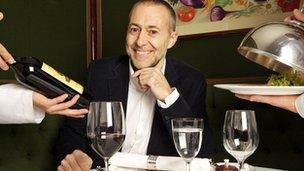Why is service still so bad in the UK?
- Published
- comments

In many European countries being a waiter is a sought-after job
Bad customer service is unforgivable and it's everywhere in the UK, says Michelin-starred chef Michel Roux Jr. So why is it still so bad?
Surly, slapdash and dreadful. That's how chef Michel Roux Jr sums up customer service in the UK.
"It's not just in restaurants, you get bad service anywhere," he says. "Even buying a newspaper you can find that you're not even acknowledged. There's no eye contact, no greeting or anything. Bad service is unforgivable and it's everywhere in the UK."
He has a point. The UK came a disappointing 14th in the 2010 international customer service rankings from the Nation Brand Index and was ranked 13th for its "welcome" by visitors. Top is Canada, followed by Italy and Australia.
It doesn't bode well for a country just months away from a royal wedding that's expected to attract millions of visitors to the UK, followed by the Olympics next year. Even for Britons, poor customer service is a national bugbear, up there with the weather.
Snobbery
For Roux, good service in a restaurant is as important as good food. If people don't feel welcome they won't come back. It's the same in any business, regulars are their life-blood.
Yet, despite how important it is, why is the UK still lagging so far behind? It's a hangover from the British class system, says Roux.
"The issue of service in Britain is, maybe, a class problem with service seen as subservient," he says. "The old Upstairs-Downstairs syndrome, where it is only for the lower classes."

Roux says service is as important as food
Fred Sirieix, general manager of London restaurant Galvin at Windows, agrees there is lingering snobbery about the service industry. In reality, it can be an extremely lucrative job, with top front-of-house people earning anything from £50,000 to six figure sums in the best restaurants.
"There is so much interest about food and going out. When I meet people they find my job fascinating, but no one wants to do it," he says.
This persistent feeling in the UK that providing service is somehow a second-class occupation is also to blame for the service sector not being pushed as a career in the same way it is in countries like France, Spain and Italy.
"People don't see it as a career option," says Sirieix. "Waitering tends to be a stop-gap or part-time job in between university or another career. You need to be a bit of an Arsene Wenger, get people when they're 15 and train them up. Once people have been with us for a couple of years they really are the best."
Basic courtesy
Retail guru Mary Portas tackles the issue in her new series Secret Shopper, starting next week on Channel Four. In it she goes undercover in big chain stores to expose hopeless customer service. "We're probably one of the worst countries in the world for customer service now," she says.
Roux also gets to grips with it in his new BBC Two series Service, where he trains eight young people to work front-of-house in a top restaurant.
One of the things that has shocked him most about making the show is how little some of the young people he has been working with know about basic courtesy.
"Just saying please and thank you, I was aghast that some of these kids found it very difficult even to utter those words," he says. "There's not much more basic in life than that, it's simple upbringing. Whatever your background, courtesy matters, and then being smart.
"Knowing how to present yourself is something that should be taught by parents and in schools. It should be second nature, I was surprised that I had to teach some of them those basics. I think there has been a loss of respect through the generations."
This lack of awareness about customer care has left a huge skills gap in the UK.
"The problem now is finding staff in this country," says Sirieix. "At Galvin we have three people out of a staff of 40 who are British. Finding staff who you can trust to really look after customers is a nightmare at the moment - especially if you're looking for someone a bit more trained and skilful, like a sommelier."
Embarrassing
He's not the only one finding it hard, with 65% of businesses saying employees lacked necessary customer service skills in a recent report by People 1st, a skills council for leisure and tourism.
It is behind a recently-launched national campaign to train 200,000 hospitality and tourism staff for London's 2012 Olympic Games and tackle the UK's poor customer service. Tourism chiefs estimate that £2bn could be generated from the anticipated half a million visitors around the Olympics.
Twickenham Stadium and the London Eye are among the venues which have already signed up to the WorldHost training programme, which was used successfully at the Vancouver Winter Olympics.
"There is a lot of focus on developing the infrastructure for the 2012 Olympic and Paralympic Games, but not enough on ensuring we have the softer skills needed to welcome the world to Britain," says Brian Wisdom, chief executive of People 1st.
But if things are to improve, customers have to pull their socks up too. They have to demand better service to push standards up.
"The British have a little bit of a hang up about complaining and probably don't know how to complain," says Roux.
"There are ways to put your complaint across if you're not happy, rather than making a big scene at the end. If you want great service, it's up to the customer as well to communicate. It shouldn't be embarrassing."